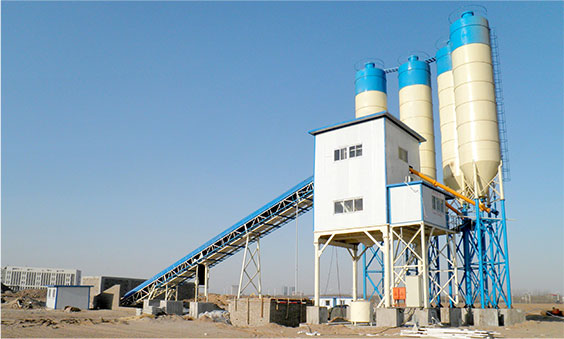
Concrete Production Woes Solved: Practical Tips for Operating a Concrete Mixing Plant
Concrete is the most widely used construction material in the world, and the demand for it is only increasing. However, producing high-quality concrete can be a daunting task, especially for those who are new to the concrete mixing plant industry. In this article, we will provide practical tips for operating a concrete mixing plant, helping to solve common concrete production woes.
Introduction
Concrete mixing plants play a crucial role in the production of high-quality concrete. However, the process of producing concrete can be complex, and there are several common issues that can arise during production. In this article, we will provide practical tips for operating a concrete mixing plant, helping to ensure the production of high-quality concrete.
Importance of Maintaining the Concrete Mixing Plant
Before we dive into the practical tips for operating a concrete mixing plant, it's important to understand the significance of maintaining the plant. A well-maintained plant can produce high-quality concrete, whereas a poorly maintained plant can lead to several production woes. Hence, regular maintenance of the plant is crucial to avoid production delays and to produce high-quality concrete.
Tips for Operating a Concrete Mixing Plant
Tip 1: Select the Right Mixing Plant
The first and foremost tip for operating a concrete mixing plant is selecting the right plant. The plant should be capable of producing the required amount of concrete and should be easy to operate and maintain. It's important to assess the production requirements and select a plant accordingly.
Tip 2: Regular Maintenance
As mentioned earlier, regular maintenance is crucial for the smooth operation of a concrete mixing plant. Maintenance includes inspecting and repairing damaged parts, lubricating moving parts, and replacing worn-out components. A well-maintained plant can prevent downtime and ensure the production of high-quality concrete.
Tip 3: Quality Control
Quality control is another critical aspect of operating a concrete mixing plant. Quality control involves testing the concrete for its compressive strength, slump, air content, and other properties. Regular testing helps to identify any potential issues in the production process, which can be rectified promptly.
Tip 4: Training the Staff
Training the staff is an important aspect of operating a concrete mixing plant. The staff should be well-trained in the operation and maintenance of the plant. It's important to ensure that the staff is aware of the safety protocols and procedures.
Tip 5: Using the Right Raw Materials
Using the right raw materials is crucial for producing high-quality concrete. The quality of the raw materials used directly impacts the quality of the final product. It's important to use high-quality raw materials to ensure the production of high-quality concrete.
Tip 6: Proper Loading and Mixing
Proper loading and mixing of the raw materials is crucial for producing high-quality concrete. The raw materials should be loaded in the correct sequence and in the right quantities. The mixing should be done thoroughly to ensure a homogenous mixture.
Tip 7: Cleaning the Plant Regularly
Cleaning the plant regularly is crucial for the smooth operation of a concrete mixing plant. The plant should be cleaned after every batch to avoid the buildup of concrete residues. Regular cleaning can prevent clogging and damage to the plant.
Tip 8: Monitoring the Production Process
Monitoring the production process is important to identify any potential issues in the production process. Monitoring includes tracking the raw materials' quantities, checking the mixing time, and ensuring that the concrete is poured within the specified time frame.
Tip 9: Proper Storage and Transport
Proper storage and transport of the concrete are crucial for maintaining its quality. The concrete should be stored in a cool and dry place to avoid rapid evaporation of water. The transport should be done in a way that minimizes segregation and maintains the consistency of the concrete.
Tip 10: Safety Measures
Safety is of utmost importance when operating a concrete mixing plant. The staff should be aware of the safety protocols and procedures. The plant should be equipped with safety devices such as emergency stop buttons, fire extinguishers, and first aid kits.
Tip 11: Environmental Considerations
Concrete production can have environmental impacts. It's important to consider environmental considerations such as using recycled materials, minimizing waste, and reducing emissions. Adopting sustainable practices can reduce the plant's environmental footprint.
Tip 12: Troubleshooting Common Issues
Despite taking all the necessary precautions, common issues can arise during the production of concrete. Troubleshooting common issues such as low strength, high slump, and segregation can help to prevent production delays and ensure the production of high-quality concrete.
Tip 13: Continuous Improvement
Continuous improvement is an important aspect of operating a concrete mixing plant. The staff should be encouraged to identify areas for improvement and suggest innovative solutions. Regular audits can help to identify areas for improvement and implement corrective actions.
Tip 14: Maintaining Records
Maintaining records is important for tracking the plant's performance and identifying areas for improvement. The records should include information such as the production rate, raw material usage, and testing results. Analyzing the records can help to optimize the production process and ensure the production of high-quality concrete.
Tip 15: Seeking Professional Help
Finally, seeking professional help is recommended when operating a concrete mixing plant. Professional consultants can provide valuable insights and suggest solutions for optimizing the production process.
Conclusion
Operating a concrete mixing plant can be a challenging task, but with the right tips and precautions, it's possible to produce high-quality concrete consistently. Regular maintenance, quality control, proper loading and mixing, and adopting sustainable practices can help to solve common production woes. Seeking professional help and continuously improving the production process can help to optimize the plant's performance and ensure the production of high-quality concrete.
FAQs
- What is a concrete mixing plant?
- A concrete mixing plant is a facility used to mix raw materials such as cement, aggregates, and water to produce concrete.Why is regular maintenance of a concrete mixing plant important? Regular maintenance is important for the smooth operation of a concrete mixing plant. A well-maintained plant can prevent downtime and ensure the production of high-quality concrete.
- What are the common issues that can arise during concrete production?
Common issues that can arise during concrete production include low strength, high slump, and segregation. - How can environmental considerations be incorporated into concrete production?
Environmental considerations such as using recycled materials, minimizing waste, and reducing emissions can be incorporated into concrete production to reduce the plant's environmental footprint. - Why is continuous improvement important in operating a concrete mixing plant?
Continuous improvement is important in operating a concrete mixing plant because it helps to identify areas for improvement and implement corrective actions to optimize the production process. By continuously seeking ways to improve, the plant can increase efficiency, reduce costs, and produce high-quality concrete consistently. This can lead to better customer satisfaction and help the plant stay competitive in the market. Additionally, continuous improvement can help the plant adopt new technologies and sustainable practices to reduce its environmental footprint.
Contact Information
E-mail: market@smachine1983.com
Wechat/WhatsApp: +86 19913897707
Website: http://www.smachine1983.com
Zhengzhou Smart Machinery Manufacture Co., Ltd.








.jpg)



